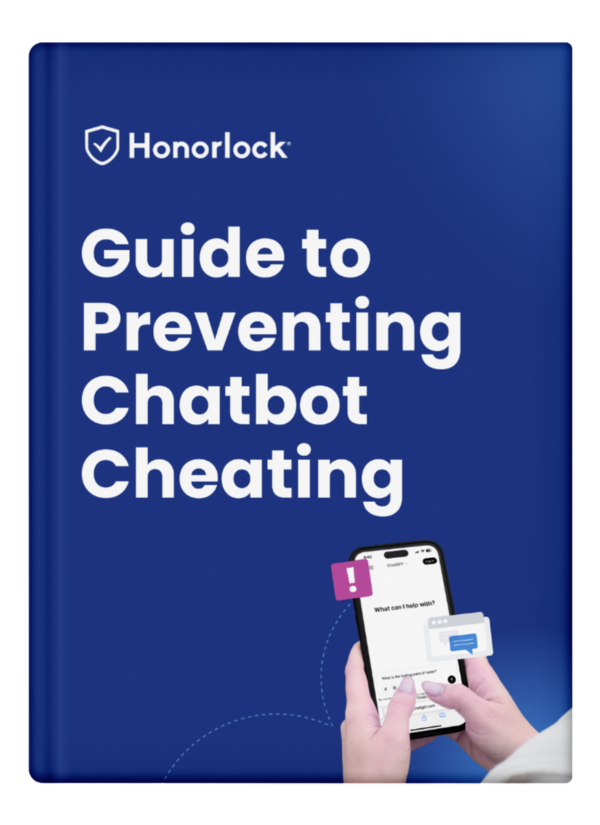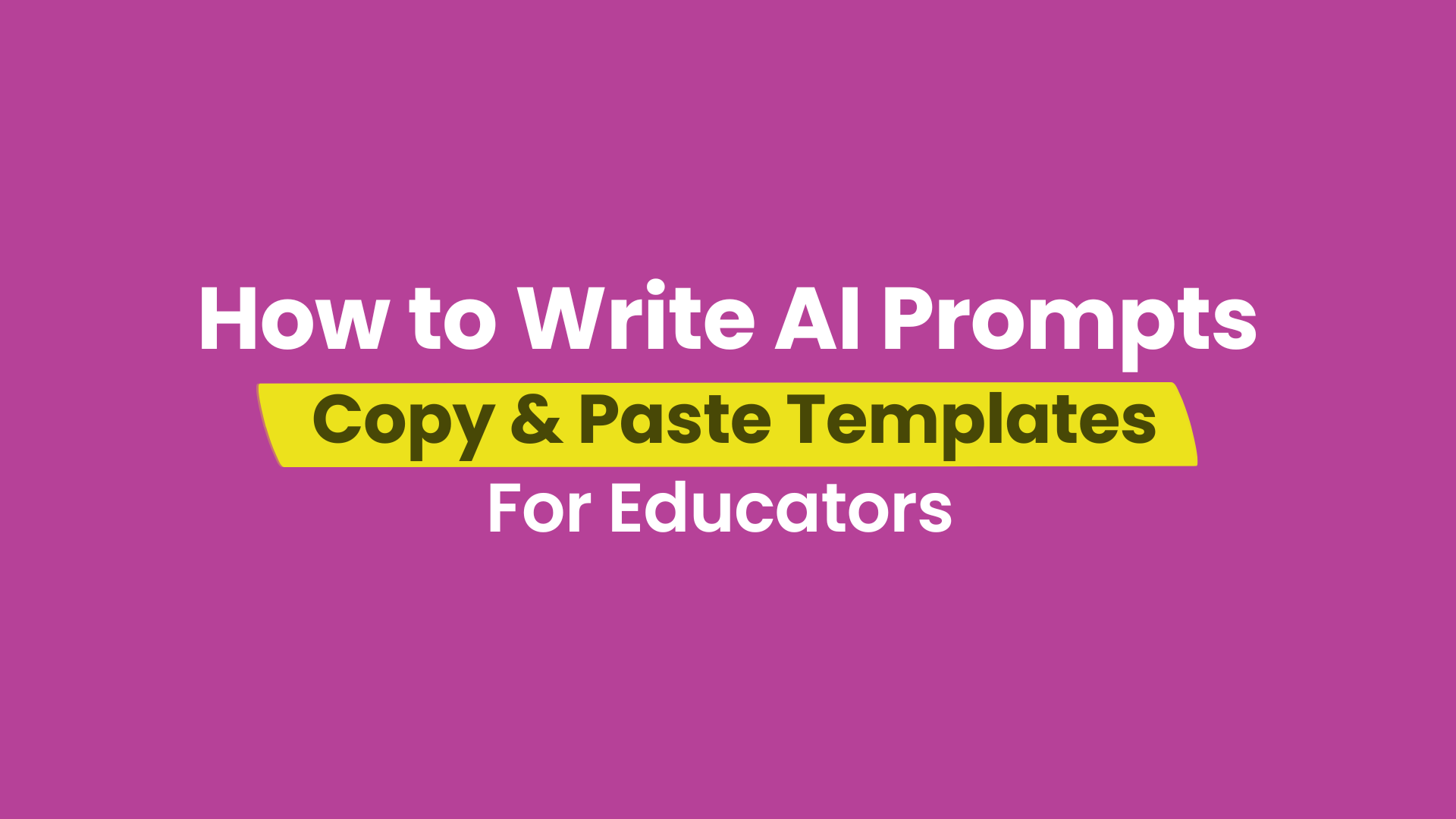Proctored essays are a thing now, thanks to generative AI chatbots like ChatGPT, Claude, and Google Gemini. These chatbots can generate content on virtually any topic in a matter of seconds. They write well, and with the right instructions, they can write just like us.
AI and plagiarism detection won't cut it
AI detection and plagiarism detection are similar, but different. Both aim to detect unoriginal content, but their focus is different.
- AI detection looks for writing patterns, like word choice and sentence structure, to identify AI-generated text.
- Plagiarism detection compares text against huge databases of content to identify copied or paraphrased content from other sources.
Why won't they work?
- Plagiarism detection is irrelevant at this point. Most aren’t copying text word-for-word, and there are plenty of AI writing tools that can paraphrase text for them. Adding to that problem, AI chatbots don’t plagiarize.
- AI detection is improving, but still waaaaay behind. They aren’t very accurate, and they’re easy to deceive (just make a few edits).
That isn’t just our opinion, though.
A study by Weber-Wulff et al. (2023) tested 14 AI detection tools—12 publicly available & two commercial—against ChatGPT, and here are the findings:
- AI detection tools can misidentify AI-generated text as human-written and struggle to detect AI content translated from other languages.
- Manually editing AI-generated text reduces the accuracy of AI detection tools: swapping words, reordering sentences, and paraphrasing decrease the detection tools’ accuracy.
Studies by Liu et al. (2024), who tested six AI detectors (5 publicly available, 1 commercial), and by Sadasivan et al. (2023) found that AI detectors also struggle to detect AI-paraphrased text.
Another thing working against AI detection tools is that using specific prompt details (writing instructions) helps AI chatbots “write” like humans do. Here’s an article with templated AI prompts for educators to use in their courses.
With those inaccuracies in mind, what if the software indicates that 50% of the text is AI-generated. Would you take action at that point? Or would you require a higher percentage as for more “proof”? If so, what’s your threshold?
Guide to Preventing Chatbot Cheating
Complete the form to access the 6-part guide

How to proctor essays and written assignments
Whether it’s a 1,500-word research paper or a series of short answer responses, Honorlock’s exam proctoring system makes it simple to secure essays and other written assignments, whether they’re typed or handwritten.
To sum up the process, Honorlock proctors essays just like online exams, meaning learners WON’T be able to do the following while writing:
- Access other websites, applications, books, or their notes, unless permitted by the instructor
- Paste content they copied before starting the essay
- Use generative AI to answer questions or write content
- Look up information on their cell phones
- Ask Siri, Alexa, and other voice assistants for help
Honorlock online proctoring features to secure essays and other written assignments
Lock the browser to restrict access to other sites & applications
Our BrowserGuard™ feature lets you block all applications and websites except the one being used for writing, like Microsoft Word, or you can allow access only to specific applications and websites, such as research journals, while blocking everything else. This secure browser also records their screen and limits them to using one screen.
Block generative AI tools during proctored essays
Blocking AI is challenging, but Honorlock’s online proctoring system effectively prevents the use of generative AI by disabling copying and pasting, locking the browser and blocking extensions, listening for voice assistant activation commands, and detecting cell phones.
Detect cell phones & other devices
Honorlock proctoring technology detects cell phones from all angles, so you won’t need to rely on a proctor seeing a phone in real-time to know that they aren’t using them to look up information while writing their essays. Our AI detects when learners use cell phones to look up information, and it detects the presence of Apple devices in the testing area.
Listen for speech to make sure Siri & Alexa aren’t helping
Honorlock’s AI proctoring technology listens for “Alexa” or “Hey Siri” and other specific commands that activate voice assistants. If any suspicious activity occurs, it alerts a live proctor to review it, records what was said, and provides a transcript for review.
This allows learners to talk through their essays without being flagged for irrelevant sounds like doorbells or coughing.
But what if a learner accidentally triggers our voice detection by saying a phrase that’s also a command for a voice assistant, such as “Okay Google”?
Our AI would notify a live proctor, but the proctor doesn’t immediately intervene. Instead, they review the situation in an analysis window, and if they determine no cheating occurred, they won’t intervene or disrupt the learner.
Block copying & pasting
Honorlock’s secure test browser prevents keyboard shortcuts, like copying and pasting. This also blocks them from pasting text they copied from another source before the test.
Scan the room for unauthorized resources & other people
Instructors can require a room scan before starting the proctored essay. This ensures that no unauthorized resources, like cell phones and books, or other people are in the room.
Verify who they are before the exam/assignment begins
Quickly authenticate their identity—it takes about a minute or less—to make sure that the person writing the essay is the same as the person getting credit.
Additional settings to proctor handwritten essays (or math) using pen/pencil and paper
Adjust proctoring settings
The instructor turns on Scratch Paper Allowed within Honorlock’s proctoring settings, and the AI won’t flag learners for looking down at their paper while writing or completing a math problem.
The learner simply shows the blank paper before they start writing and uploads the written essay after they complete it.
Give the live proctor instructions & rules allowing handwritten essays
Providing the proctor with instructions that allow handwritten essays and rules for learners helps keep the review process organized.
Rules for proctored math tests or essays can include things like:
- Only use a black or dark blue pen and blank/lined white paper
- You can write on both sides of the paper
- Before you begin writing, hold the blank paper up to the camera and show both sides
- Write the question number in the top left corner of the paper
- Hold the paper up to the camera after you finish writing your response to each question
How does Honorlock work?
Honorlock’s hybrid proctoring software and services combine AI with live proctors and 24/7 live support. Unlike other online proctoring services, Honorlock makes the entire experience smooth and hassle-free. Remotely proctored exams can be taken 24/7 without the need for scheduling, and learners can get technical support from a real person.
During proctored essays and assessments, learners won’t struggle with old, slow software or feel uncomfortable because a live proctor—a stranger—is watching them the entire time.
AI monitors behavior
Detects misconduct?
No misconduct, no intervention
Otherwise, the learner won’t be interrupted, and instructors and admins won't need to review irrelevant flags.
Access exam reports & recordings
Ready for a demo?









